The stunning announcement that Israel and the United Arab Emirates had brokered what came to be known as the Abraham Accord through the Trump Administration has brought the small Jewish community of the Emirates into the limelight of global interest.
The resilience of the Jews of the UAE is one of the most interesting stories in light of the anti-Jewish (or anti-Israel) sentiment and demise of many Jewish communities in the Middle East. It is the story of individuals from various backgrounds who, one by one, came to Dubai or Abu Dhabi and formed a community that played an important role in the developing deal.
Some of its first members were Sharon and Simon Eder, Ranna and Giacomo Arazi and Michael and Martine Nates, all coming in about 2008. There certainly were others, but they apparently had remained under the radar.
The UAE is located on the Gulf at the northeastern end of the Arabian Peninsula, bordering Oman to the east and Saudi Arabia to the south and west. As the name implies, it is a federation of seven political territories, each independently governed by its own emir.
The Emirate of Abu Dhabi, which serves as the capital, is joined by Ajman, Dubai, Fujairah, Ras Al Khaimah, Sharjah and Umm Al Quwain. (Qatar and Kuwait, although emirates, are not part of the UAE.)
The seven entities are represented in the world community by their highest constitutional authority, the Federal Supreme Council.
Its president is one of the seven rulers. The current president is Abu Dhabi’s crown prince, Sheikh Mohammed bin Zayed Al Nahyan. Sheikh Mohammed bin Rashid Al Maktoum, ruler of the Emirate of Dubai, is vice president and prime minister of the UAE.
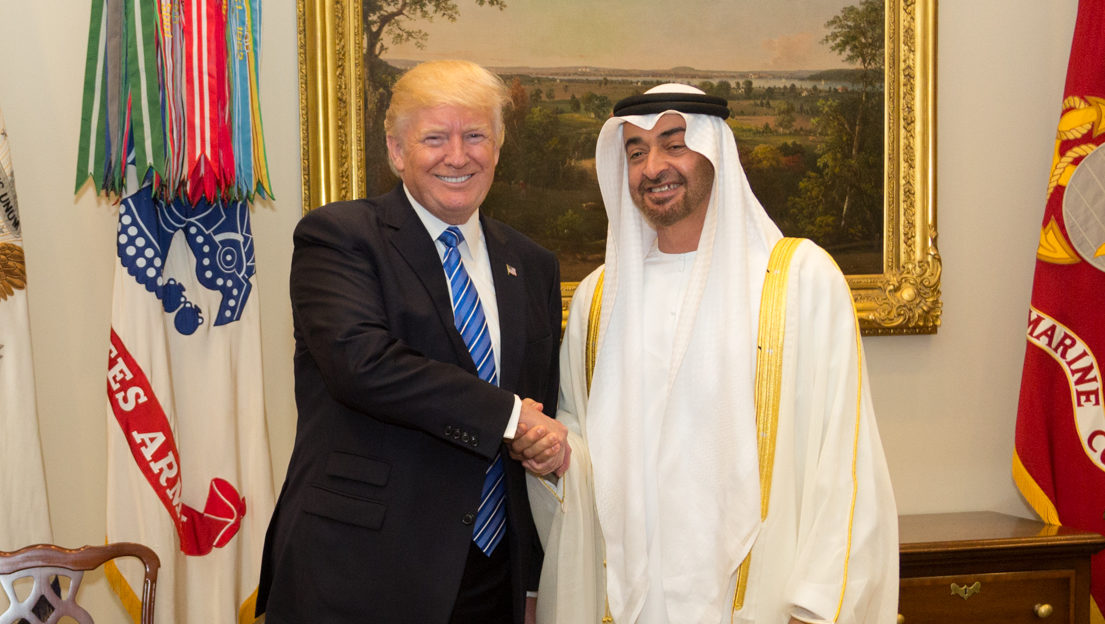
US President Donald Trump hosts Sheikh Mohammed bin Zayed Al Nahyan at the White House in May 2017. (Shealah Craighead/White House)
The largest population among the Emirates is in Dubai, with some 3.3 million people. Abu Dhabi’s population stands at 1.5 million.
Sharon and Simon Eder
Among the first known Jews to reside in Dubai in the 21st century were Sharon and Simon Eder, both born and raised in the United Kingdom.
Sharon’s mother was from Libya and her father from Iraq. Simon’s parents, both of Ashkenazi descent, grew up with strong Jewish identities. Sharon attended Hebrew school and Simon observed the Sabbath.
“Shock and negative reaction” is how Sharon describes the response by friends and family to the Eders’ decision to move to an Arab country, where Simon was offered a job in the conference industry.
“We were absolutely the first. I’m sure there were Jews there, but they didn’t really congregate,” Sharon tells The Media Line.
We were absolutely the first. I’m sure there were Jews there, but they didn’t really congregate
“Prior to leaving London, we received three different phone numbers [of couples known to be moving to Dubai]. Then we realized the three numbers were the same, and all belonged to Ranna and Jack Arazi, who also moved from the UK around the same time.”
Upon their arrival in the Gulf, the two families connected and began sharing traditional Friday night Shabbat dinners. The discussions always turned to the idea that there must be other Jews living there, too.
“We always spoke like the TV series Lost – there must be another part of the island,” Sharon says. “My husband would say randomly, ‘That person looks Jewish,’ and often we would get it wrong.”
Finally, a good friend of the Eders’ from London introduced them to another Jewish couple while they were slowly meeting others by chance. That was the starting point of the community.
“In 2009, I fell pregnant, and that played a big part for Simon and me. We’re really happy here; we both had strong Jewish identities; how long can this go on?” she recalls thinking at the time.
“At the time I got pregnant, I was traveling all over the world for my job, working for Bacardi, heading up the region from a local office in Dubai,” she relates.
“I was five months pregnant [in 2010] and we decided to fly to Sri Lanka for Passover. As chance would have it, we went to Chabad and the rabbi said, ‘This is crazy, I never knew anybody from Dubai,’ but [the previous day] a man [had come] to him from Abu Dhabi,” she says.
Sharon explains to The Media Line that the man had been in the Middle East for decades. He was the head of an institution in Abu Dhabi and spoke 12 languages flawlessly.
“We decided to call him up,” she says.
“At that point, I was due in August,” she continues, “and we basically would stay in Dubai for the holidays and try to get a rabbi to come. He knew other Jews and enabled [them to practice their Judaism]. We sent out emails and asked if anyone was interested in getting a rabbi for the holidays.”
They contacted the Chabad rabbi in Sri Lanka, who came for Yom Kippur, staying a week.
“It was held in an apartment and was a big success, with 35 people attending,” she says. “After that, Sabbath dinners were held in different homes. There was a lot of excitement because either people had been practicing in secret for many years or hadn’t practiced for many years in the Arab nation.”
Sharon notes that the community was so diverse that “if we got together, the traditions followed were based on the host family.”
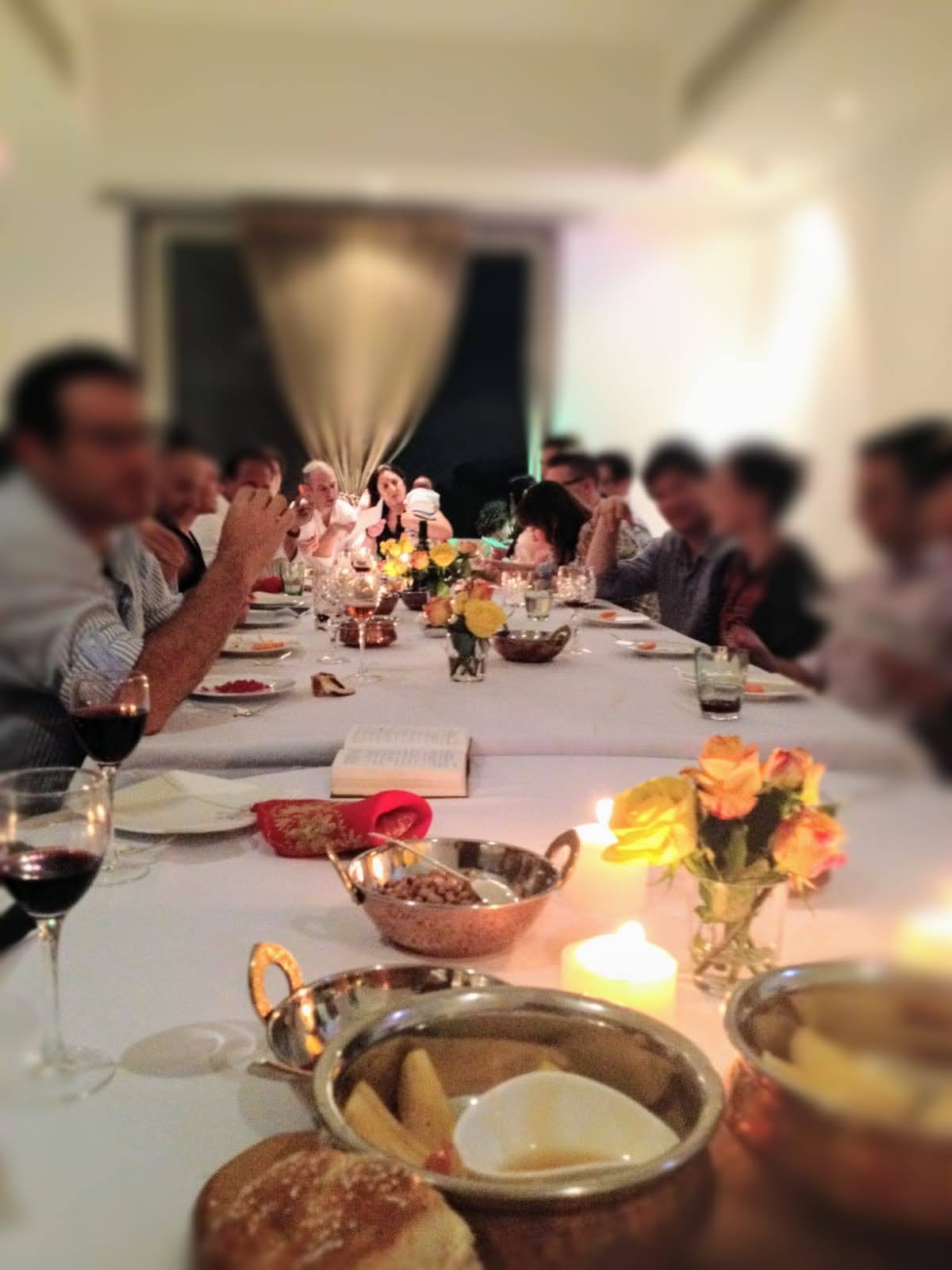
Rosh Hashana 2011. Sharon and Simon Eder sit at the far end of the table. (Courtesy)
They were meeting people, Jew by Jew.
The Eders had two children born in Dubai and had to fly in a mohel to perform the ritual circumcision. Ironically, the night before the brit mila ceremony, they received a call from a Jewish person living in Lebanon who also needed a mohel. A day later, the couple and their child flew into Dubai for their own circumcision ceremony.
Sharon shares another story of Jew-connecting-to-Jew.
“My German obstetrician said he had a Jewish patient ‘who tells me she is German, but I think she is 100% Jewish,’” she says.
“Her name was Inbal. I said to my doctor it was an Israeli name and to tell her it means ‘inside of a bell [clapper],’” she relates.
“Quite surprised, Inbal finally gave in to the German doctor, who introduced us. The morning of the evening of Yom Kippur, I called [her] and said these are the details, and please join us if you want,” she goes on.
“Inbal was shocked. She was driving on [a highway] and almost had an accident,” she says. “She came in while her German husband stayed in the car outside – he thought it was a set-up.”
Sharon remembers being heavily pregnant as she and Simon were shopping alongside a man also loading up on baby items. As they left the shop, Simon said to Sharon, “He’s 100% Jewish,” to which Sharon said: “Not again, the last one ended up being Iranian.”
Simon quickly introduced himself.
“The guy was from New York,” Sharon says, with nothing being mentioned about religion.
Six months later, they received an email from the man.
“I don’t know if you remember me but from the moment I met you, I couldn’t stop thinking you were Jewish but didn’t have the courage to ask,” he wrote.
The man added that he had been practicing his Judaism privately and finally had become so upset about it that he did a deep Google search. The next Friday night, he was sitting at Sharon and Simon’s Shabbat table for dinner.
Sharon tells The Media Line that in the early days, the Jews living there were nervous about organizing, and nothing in the way of Jewish groups was established.
“It grew organically,” she explains.
The Eders moved back to London in 2013 and had their third child there.
“We were very much there at the beginning and the first ones to step out on the ice,” she says. “By the time we left, we had well-established traditions. We celebrated Jewish holidays, the Sabbath, even Hanukkah, camping in the desert. We brought the community to the next level.”
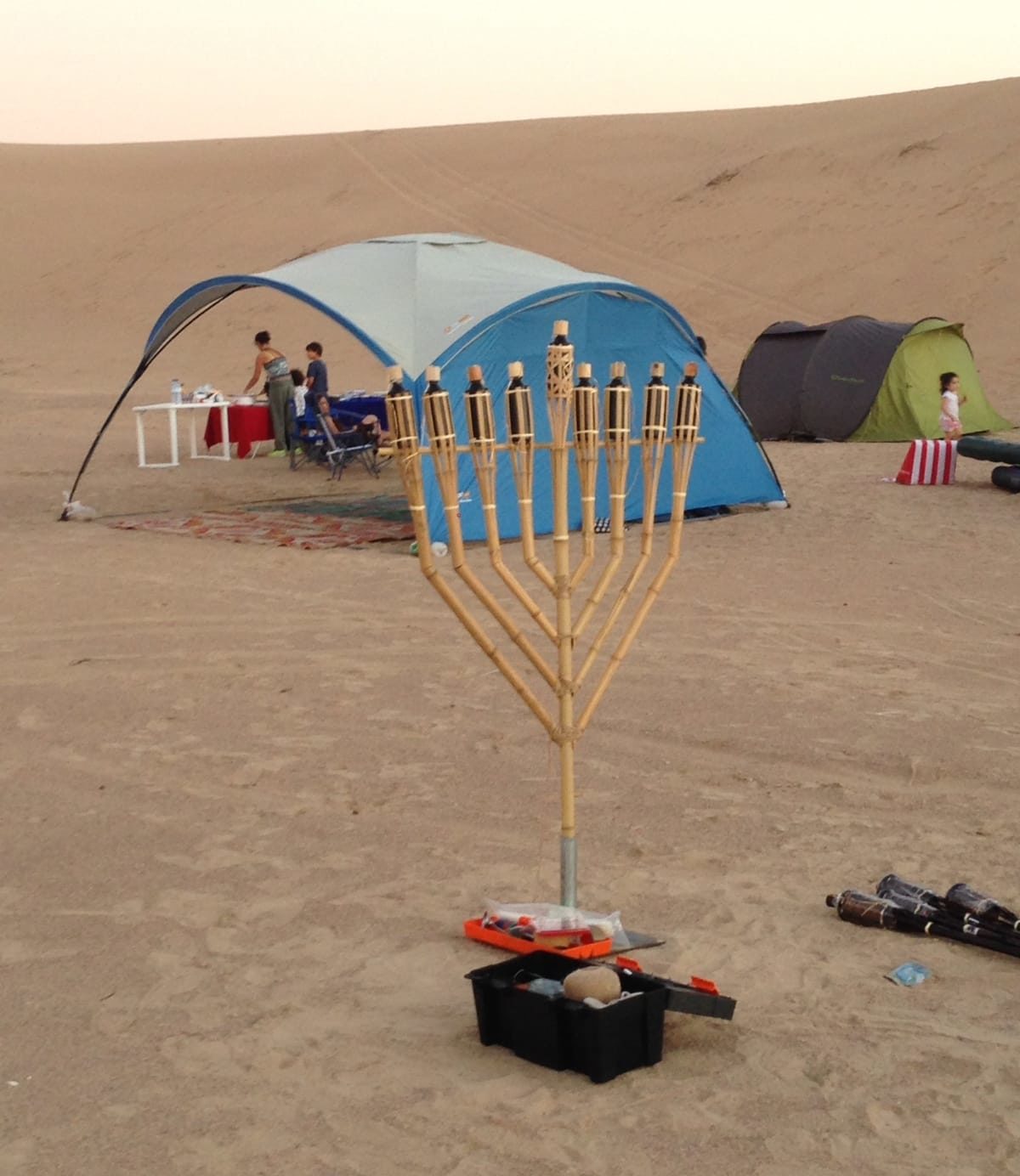
Celebrating Hanukkah in the Emirati desert. (Courtesy)
We were very much there at the beginning and the first ones to step out on the ice. By the time we left, we had well-established traditions. We celebrated Jewish holidays, the Sabbath, even Hanukkah, camping in the desert. We brought the community to the next level
Ranna and Giacomo Arazi
“Giacomo [Jack] was [approached] for a job in finance in Dubai. Of course, I was hesitant at the beginning – knowing that no community or Jewish life existed there did make it a bit daunting,” Ranna Arazi tells The Media Line.
“With a background in communications and media, and Jack’s in economics, in the first few years we started our own multi-brand exhibitions company for luxury motor shows and property exhibitions held in malls and international financial centers,” she states.
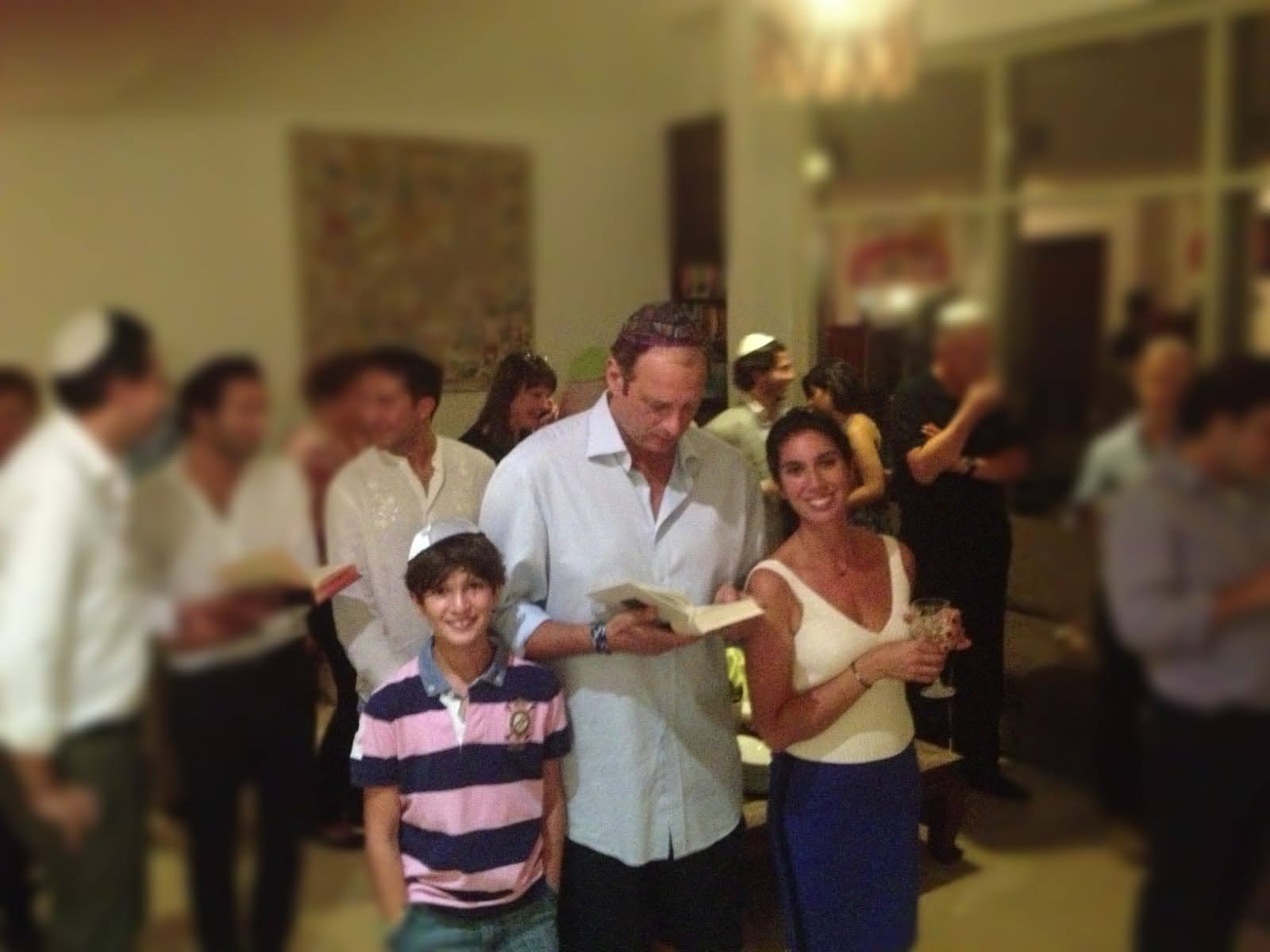
Marco, Giacomo and Ranna Arazi pose at their home in 2012 during Rosh Hashana prayers. (Courtesy)
Giacomo was born and raised in Italy. His mother was from Lebanon, his father from Syria. Ranna’s parents were both born in Tehran.
“It was like one big holiday in the beginning,” she notes. “I had friends from the UAE through travel, and other friends. The Emiratis are well educated and worldly.”
The Arazis were introduced to the Eders via mutual friends from the UK. They decided to get together regularly, and also wondered if there were other Jews living in Dubai.
“We seemed to be like a magnet. People would call us up and say they were traveling through Dubai, were religious, and could they come for dinner,” Ranna says.
“The Jewish community grew organically. We had nothing, no prayer books. Our prayers were all on iPads. But there must have been Jews in the UAE for many years prior and I presume they didn’t feel safe enough to come together. … It wasn’t something we were planning on making public at all,” she recalls.
The Jewish community grew organically. We had nothing, no prayer books. Our prayers were all on iPads. But there must have been Jews in the UAE for many years prior and I presume they didn’t feel safe enough to come together. … It wasn’t something we were planning on making public at all
“We lived in a very large villa, hosting all the large festivals, and would invite Jewish people in the community and travelers. The Eders, and Jack and I, were the pillar-founding families, then others joined in. Sixty to 70 people were at our Seder table,” Ranna says.
“Ross and Elli Kriel came for one of the holidays, and Ross, being a religious man, was interested in an Orthodox … minyan [where a quorum of 10 is required for public prayer]. However, we would all partake in [the] host’s home and respect each other’s religious observance,” she states.
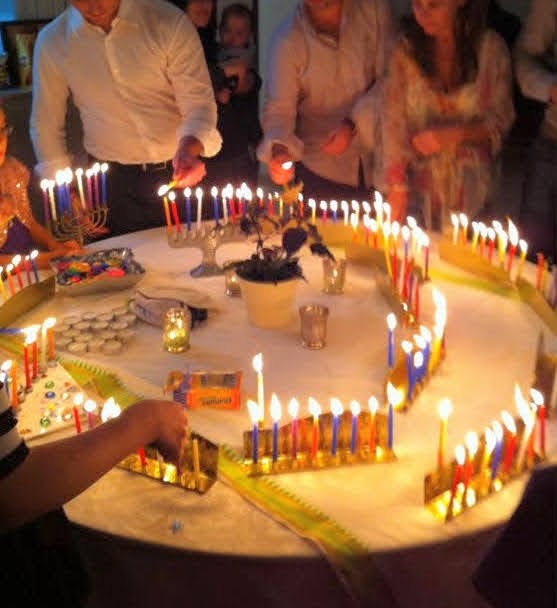
Hanukkah 2010 at the Arazi family home
The Arazis have a son, Marco, and a daughter, Sara, who was born in 2009 in Dubai – although she could not obtain UAE nationality or a passport. Nationality is conferred only by blood or through marriage.
“Marco was turning 12 and it was really important for us – and especially for Jack and his family – that he have a proper bar mitzvah,” Ranna says.
“We didn’t want to bring up two teens in an Arab country,” she goes on. “I left Dubai a few months earlier than Jack, back to London, and Ross asked Jack if [he and Elli] could use our villa for the holidays, and then if they could kosher the kitchen. We introduced them to the landlord, and that is how our home became ‘The Villa’ in Dubai.”
We didn’t want to bring up two teens in an Arab country. I left Dubai a few months earlier than Jack, back to London, and Ross asked Jack if [he and Elli] could use our villa for the holidays, and then if they could kosher the kitchen. We introduced them to the landlord, and that is how our home became ‘The Villa’ in Dubai
Elli and Ross Kriel
A mixture of South African and Greek, Elli Kriel was raised on the east coast of South Africa, near the city of Durban. Husband Ross grew up in Johannesburg in a completely secular home.
“My grandfather was an enlightenment Jew,” Ross, an in-house lawyer for ENGIE, an energy company, tells The Media Line. “I turned 18 and realized I didn’t have a Jewish identity. It bothered me. Now, 30 years later, I am an Orthodox Jew living in Dubai.”
Elli and Ross are a dynamic couple who anchor the Jewish community. When they arrived in 2013, they were the only religiously observant Jewish family in the area.
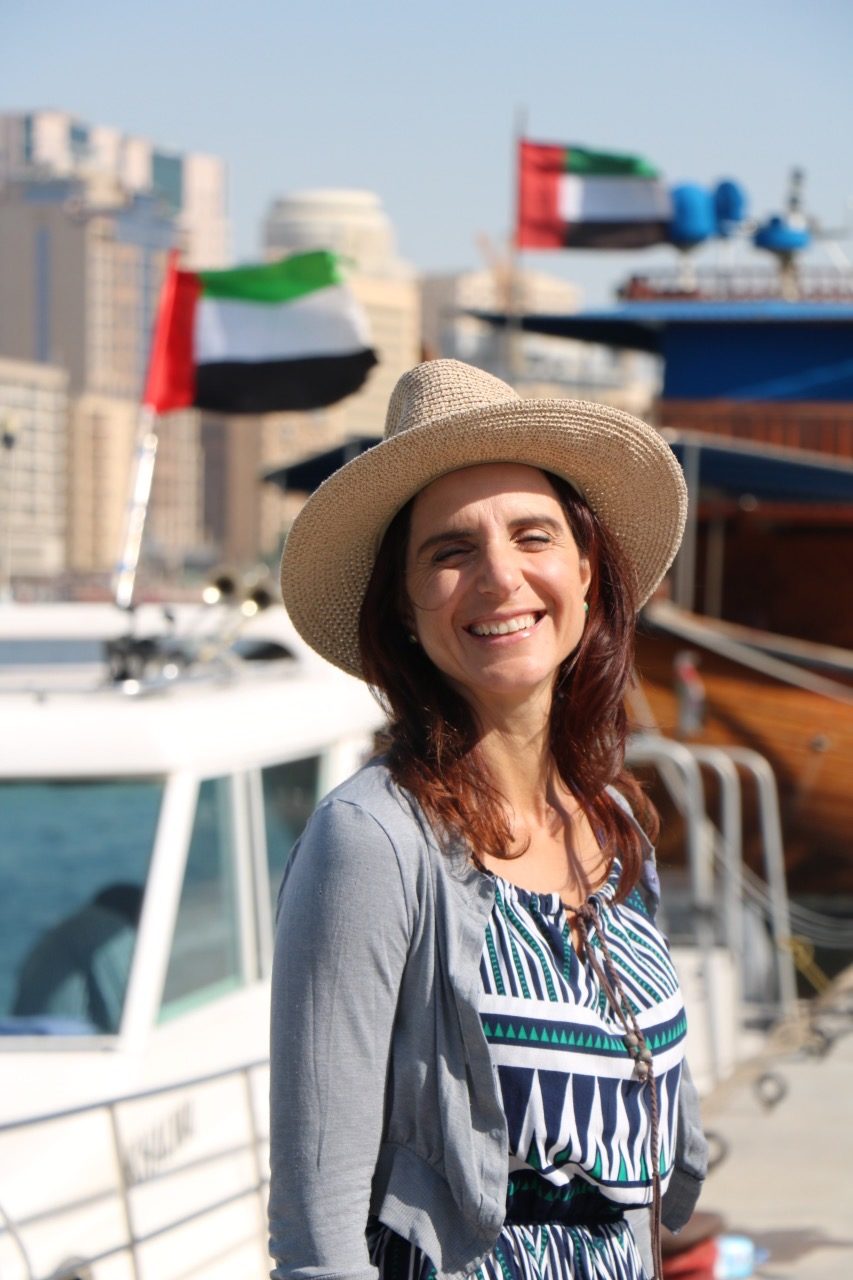
Elli Kriel at the Dubai souk. (Courtesy)
“We were completely on our own: no rabbi, no synagogue, no parents as influencers. It generated the most exciting version of Judaism,” he reflects.
We were completely on our own: no rabbi, no synagogue, no parents as influencers. It generated the most exciting version of Judaism
“Thirty or 40 Jews lived in the community. We built it up brick-by-brick and created the Jewish Council of the Emirates,” he says.
There is no resident rabbi. When a baby boy is born, the child’s family flies in a mohel to perform the circumcision.
“The minyan began in my lounge, and then I leased The Villa on behalf of the Jewish Council of the Emirates in 2015,” he explains.
The Villa serves as a community center, the Kriels the community backbone.
“I have been the de facto leader of the community for many years, and the community has been gathering since 2010,” Ross says.
Formally established in 2019, the Jewish Council of the Emirates is the umbrella body for all of the area’s Jewish communities, as well as the official link to government.
The Kriel children were born in South Africa and came to Dubai when they were three and four years old, respectively. Today, they are among 90 children in the first through the seventh grades and attend the International School.
Synagogue attendance has been suspended because of the coronavirus pandemic, but plans are in formation for a larger place of worship.
This holiday season, give to:
Truth and understanding
The Media Line's intrepid correspondents are in Israel, Gaza, Lebanon, Syria and Pakistan providing first-person reporting.
They all said they cover it.
We see it.
We report with just one agenda: the truth.


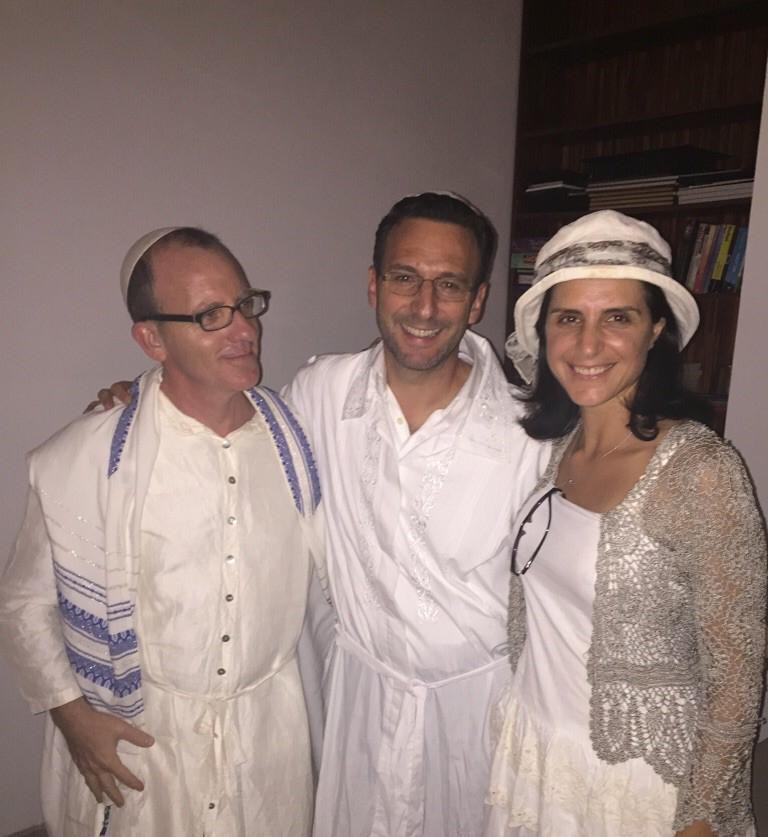
Left to right: Cantor Yossi Chajes, and Ross and Elli Kriel pose after a recent Yom Kippur. (Courtesy)
Ross explains that while the Jewish community has remained below the general public’s radar, it is well known to Emirati officials.
“We made every effort to communicate our presence and were received with a warm welcome,” he states. “Here we discovered our Judaism. Our amazing story is about our ability to rise to the circumstances. … Our presence here [is] the beginning of something hopeful about the way Jews, Muslims and Christians can work together.”
We made every effort to communicate our presence and were received with a warm welcome. Here we discovered our Judaism. Our amazing story is about our ability to rise to the circumstances. … Our presence here [is] the beginning of something hopeful about the way Jews, Muslims and Christians can work together
Elli’s Kosher Kitchen
For travel to Dubai as a kosher Jew when Elli and Ross began their journey, a wide range of basic staples including flour, oil and tuna were available. But, according to Elli, “there was nothing anyone could eat.”
Elli, who holds a doctorate in the sociology of religions and ironically studied exclusion and inclusion in multicultural contexts, began a takeout establishment from her home, offering full, hearty meals to local Jews and visitors. She would feed many of her customers in her home, eventually sending food packages to more than 400 travelers listed in her database.
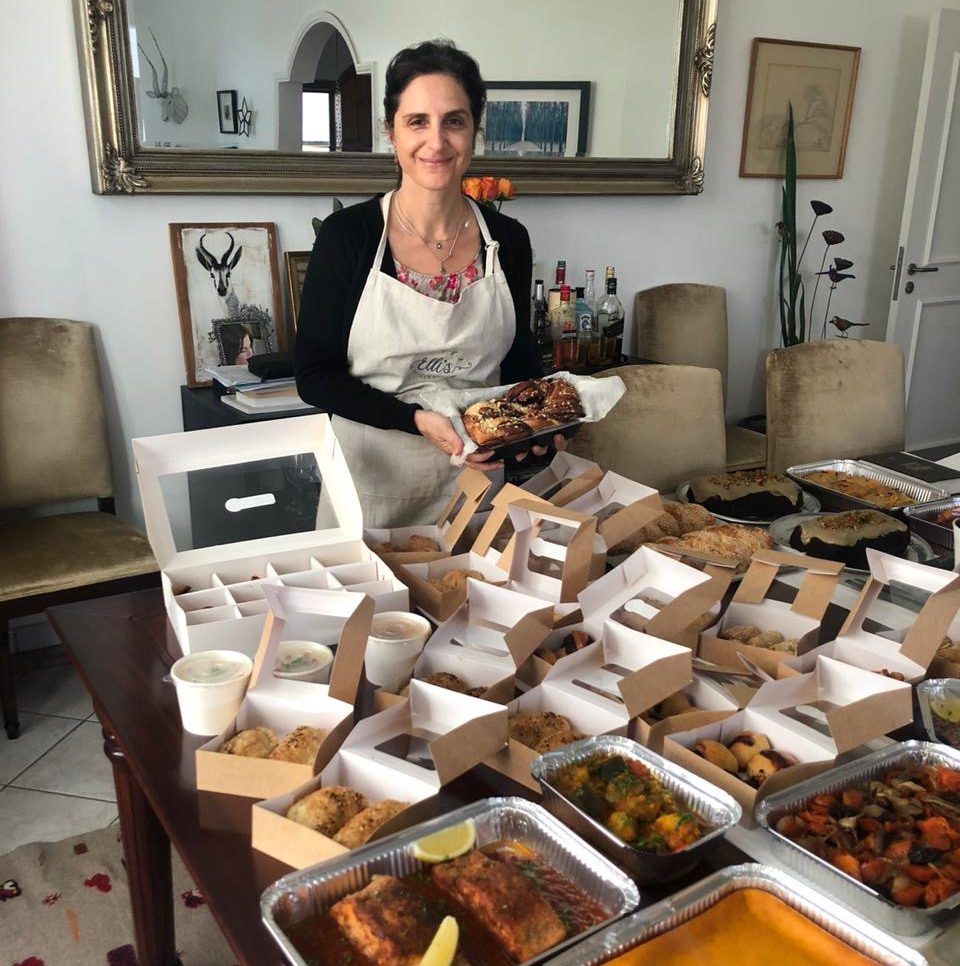
Elli Kriel with Shabbat food she prepared for hungry guests. (Courtesy)
“I’m self-taught,” she tells The Media Line, “and learned my love of cooking from my grandmother. I have all of her hand-written recipes. I was also influenced by my community in South Africa, and a lot of women share their recipes with me regularly.”
Elli sees the Jewish community in South Africa and how social change impacted on the experience as an example of the thesis she wrote for her doctorate. She explains that identity and belonging are key underlying themes.
“My life in Dubai seems to be an extension of these ideas,” she says proudly.
When the UAE hosted the Interfaith Global Conference for Human Fraternity, attended by Pope Francis, Elli catered for the Jewish delegates. Weeks later, her business was launched. From babkas and Grandma’s matzah ball soup to zatar-and-olive challah and aubergine borekas, her offerings are loved by Emiratis.
Elli was featured recently in the National, a Gulf newspaper, where she describes her food fare as “kosherati” – kosher cooking with an Emirati twist.
Elli’s Kitchen has plans to expand and establish a restaurant that will be able to handle incoming tourists and local trade. She is also looking forward to importing kosher food products to the Emirates.

Elli Kriel’s rugelach are a local favorite. (Courtesy)
Alex Peterfreund
“I saw an opportunity to move but was very concerned that, because of my religious background, I was moving not only to a physical desert but to a spiritual one and would find myself in a little room eating a traditional gefilte fish for Shabbat,” Alex Peterfreund tells The Media Line.
A 54-year-old divorcee and businessman who is originally from Antwerp and works in the diamond industry, Alex instead found himself sharing his first Friday night dinner with the Kriels at their home, not having known that a fellow Orthodox Jew lived in Dubai.
During the meal, Ross asked Alex about his plans for the next morning. When Alex replied “I’m praying in my home in the morning,” Ross responded by suggesting: “If you’re praying in your home and I in mine, why shouldn’t we pray together?”
If you’re praying in your home and I in mine, why shouldn’t we pray together?
It became a practice.
“Every Sabbath morning, we prayed as though we were 200 people praying with the Torah,” Alex says. “Eventually, a third Jewish guy from Canada of Moroccan descent came, and then a fourth – his father taught in a French school when he was a child – and suddenly a miracle happened. We had a minyan.”
The community has since outgrown The Villa and is seeking funding to establish a cultural, religious and business center where all denominations can pray and gather.
“We see the center as the Jewish business card of the Emirates,” he states.
When asked about a Jewish cemetery, he says there is none – “but it’s an interesting question!”
London’s Marble Arch Synagogue donated the Orthodox community’s first Torah, the handwritten scroll of the Five Books of Moses.
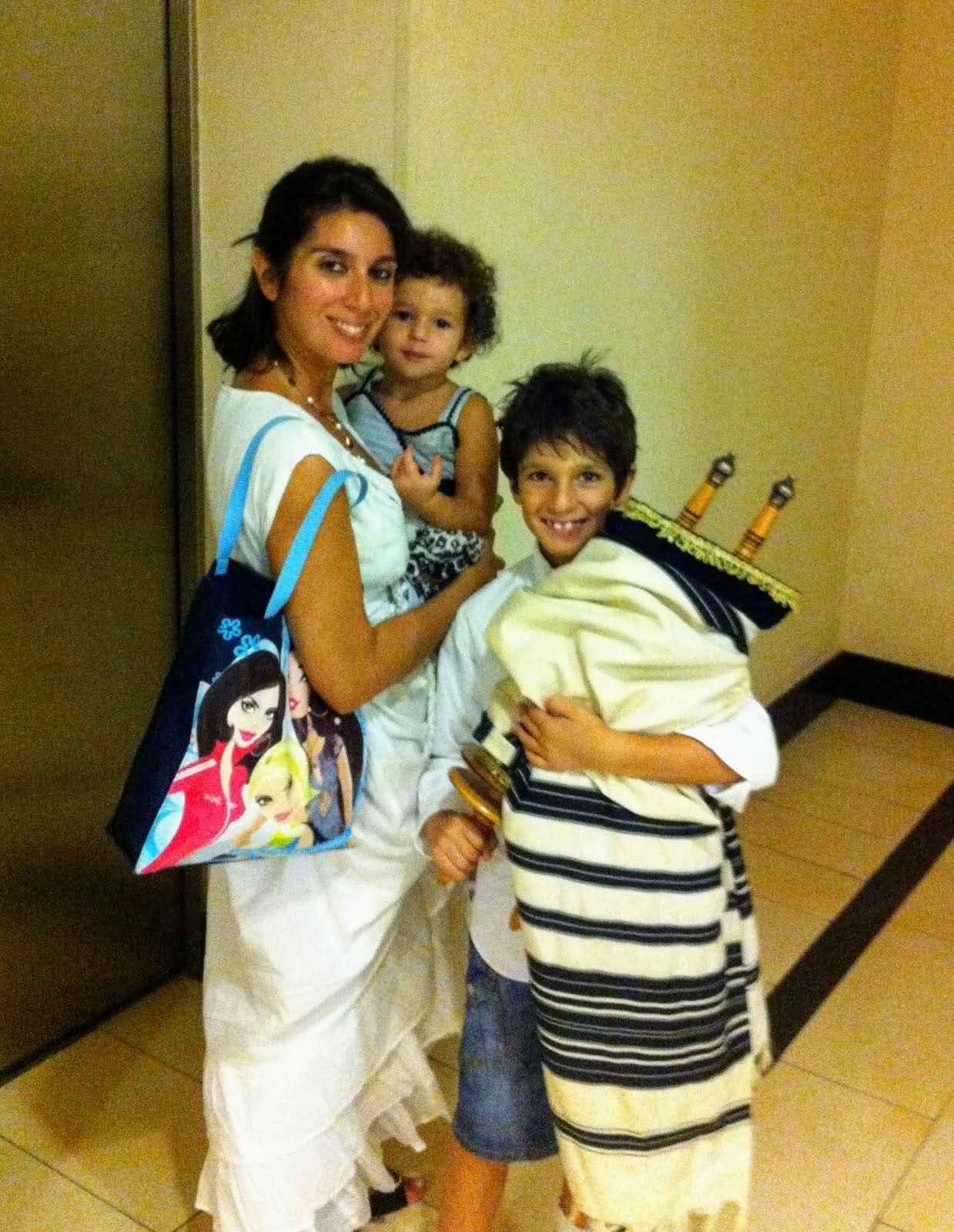
Ranna, Sara and Marco Arazi pose with the Torah donated to the community by London’s Marble Arch Synagogue. (Courtesy)
“Today we are a community of somewhere between 200 and 300 people, and on the Sabbath, maybe 30. The community is made up of people from many professions, including lawyers, doctors, businessmen and people in media,” he explains.
“We as Jews have always been discreet in the UAE, and people listen to the rules of this country and to the authority,” Alex says.
“We pray for the rulers of Dubai and Abu Dhabi, just as Jews do in England, Paris or New York for their home country of residence,” he proudly tells The Media Line.
We pray for the rulers of Dubai and Abu Dhabi, just as Jews do in England, Paris or New York for their home country of residence
Beth Margolis Rupp: Leading the Way in Abu Dhabi
“In 2008, my husband, David, our children and I visited Abu Dhabi for the first time to determine if we could live there and feel safe as a Jewish family, to live and learn about the Gulf region, and to give our youngest son a chance to learn about the region. But the 2008 economic downturn was a challenge for architects,” Beth Margolis Rupp tells The Media Line, referring to her husband’s profession.
Beth had worked in Jewish education in the previous decades and was founding director of the Satell Teen Fellowship for Leadership and Social Activism. She designed and implemented numerous programs on conservation, environmental and social justice for Philadelphia youth both in the United States and in Israel. She also taught about the universal lessons of the Holocaust.
“I did all this with both Jewish and secular lenses in America,” she says.
It was an easy transition for Beth to work remotely for Satell, so in 2009, they made the move with their youngest child after a second scouting trip.
“Our child was seven years old then and went to Jewish preschool and synagogue in Philadelphia while our older children were in college. How do you tell your child to keep religion private without shame?” she says. “When we first moved to the UAE, it was a time when Jewish people were not revealing their identity. We sought out the Jewish community.”
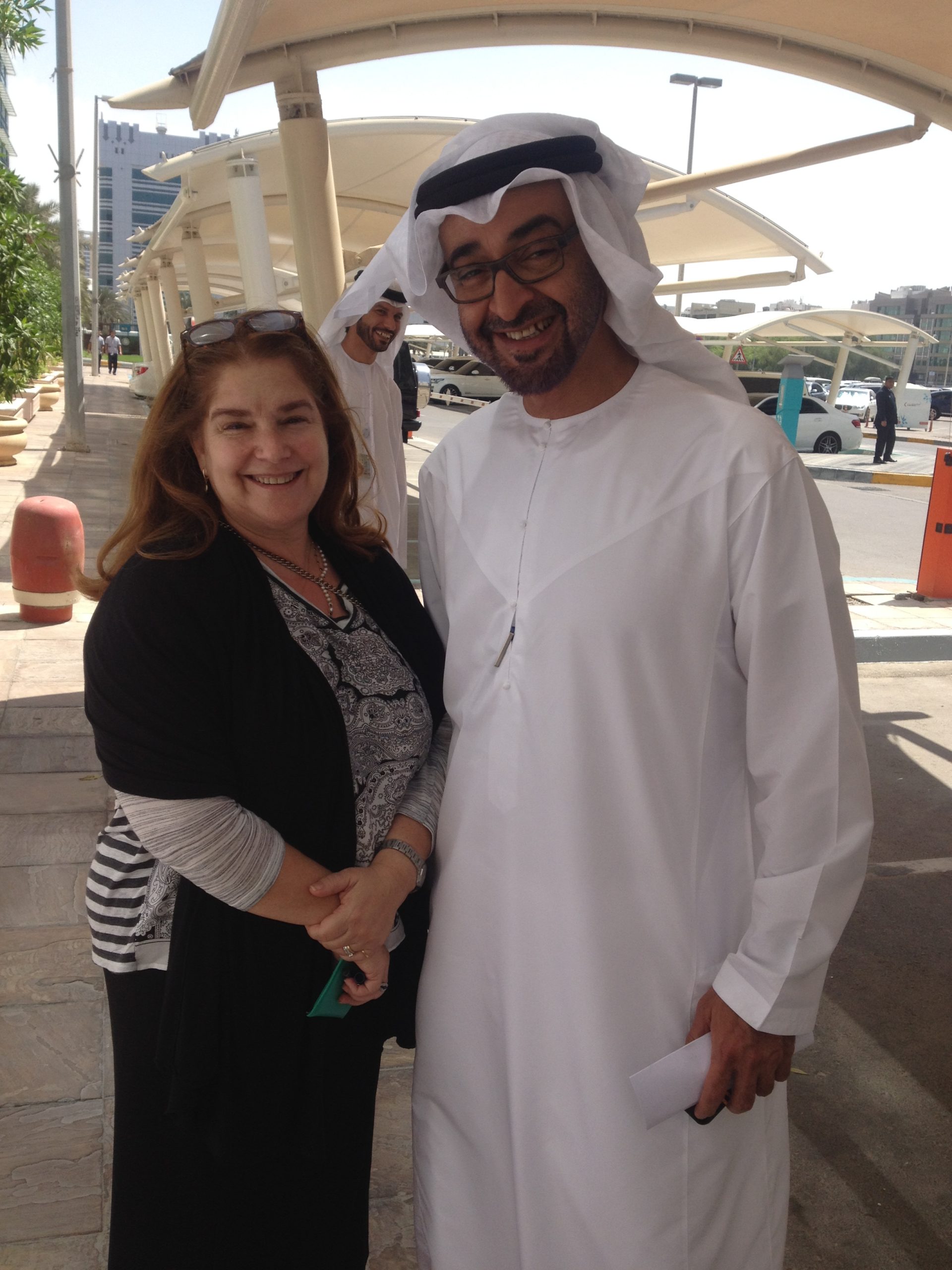
Beth Margolis Rupp poses with the crown prince of Abu Dhabi, Mohammed bin Zayed. (Courtesy)
Professionally, husband David became project director for award-winning buildings, including The Gate, The Sun and Sky Tower, and eventually the Louvre Abu Dhabi.
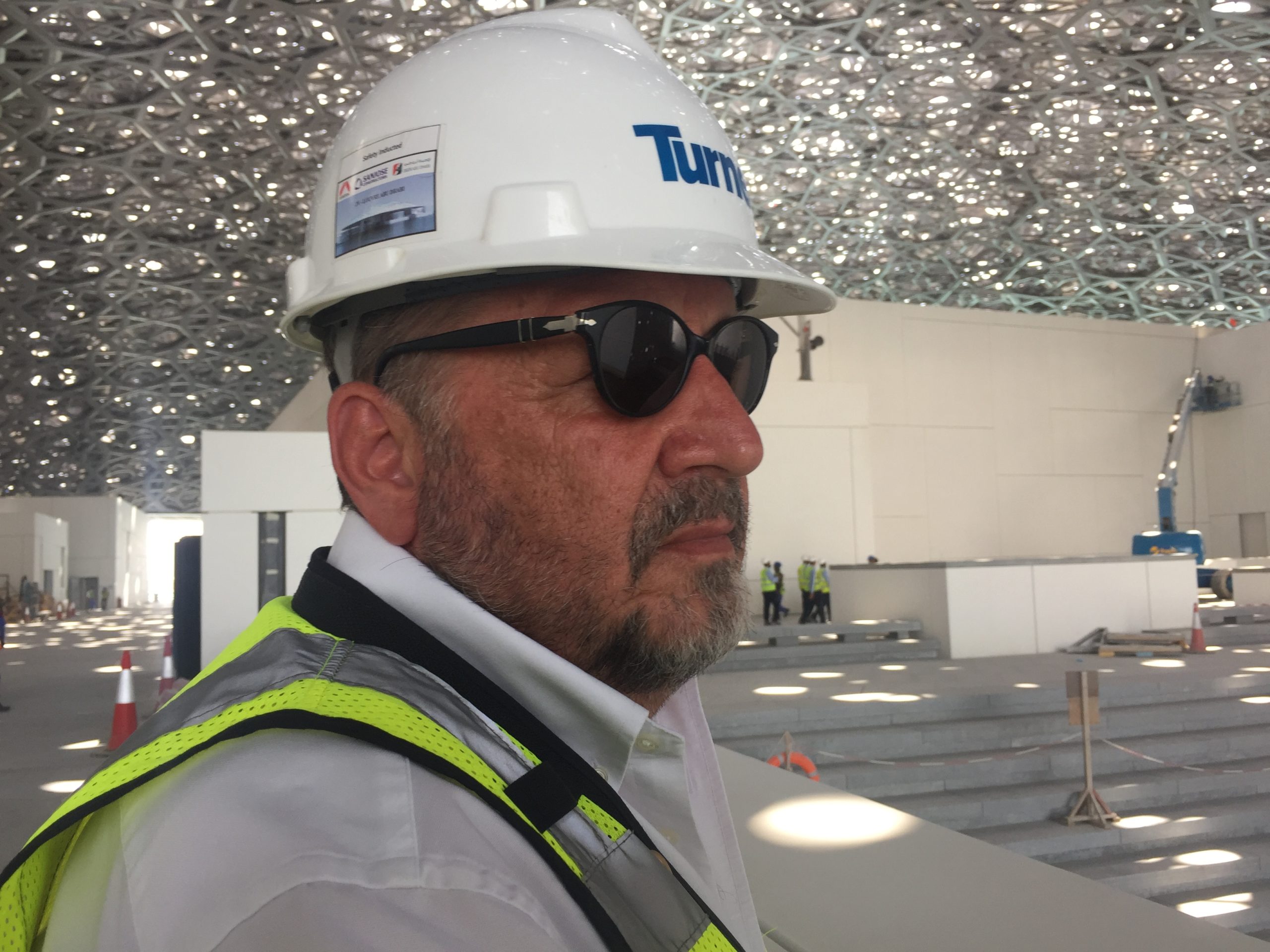
David Rupp. (Courtesy)
“I was still working in the US remotely as director of the Satell Fellowship…, then got a job with New York University and subsequently worked at the American Community School in Abu Dhabi, where my son attended. I was also a research associate for the Institute for International Security at Khalifa University,” she notes.
“Before connecting with many Jewish families in Abu Dhabi, we traveled to Cairo for our first Passover in the [region]. We needed a place to keep [the] Passover [laws and rituals],” Beth says. “Abu Dhabi was still somewhat lonely for us that first year. Our son asked the Four Questions at a Seder [the Passover ritual meal] in Cairo.”
Before connecting with many Jewish families in Abu Dhabi, we traveled to Cairo for our first Passover in the [region]. We needed a place to keep [the] Passover [laws and rituals]. Abu Dhabi was still somewhat lonely for us that first year. Our son asked the Four Questions at a Seder [the Passover ritual meal] in Cairo
In 2009, when NYU President John Sexton announced that a university campus would be hosted in Abu Dhabi, he invited the school’s Jewish chaplain, Rabbi Yehuda Sarna, to join him in interviewing young high school students seeking admission, albeit without revealing Sarna’s Jewish identity.
Starting in 2010, the rabbi began traveling to the UAE “once or twice a year.” In 2019, he became the UAE’s first chief rabbi.
Traveling to the UAE “roughly every other month” since taking up the post, he tells The Media Line he “had no idea” that the Abraham Accord was going to happen. He now predicts that the UAE will have “several full time rabbis” in the coming years.
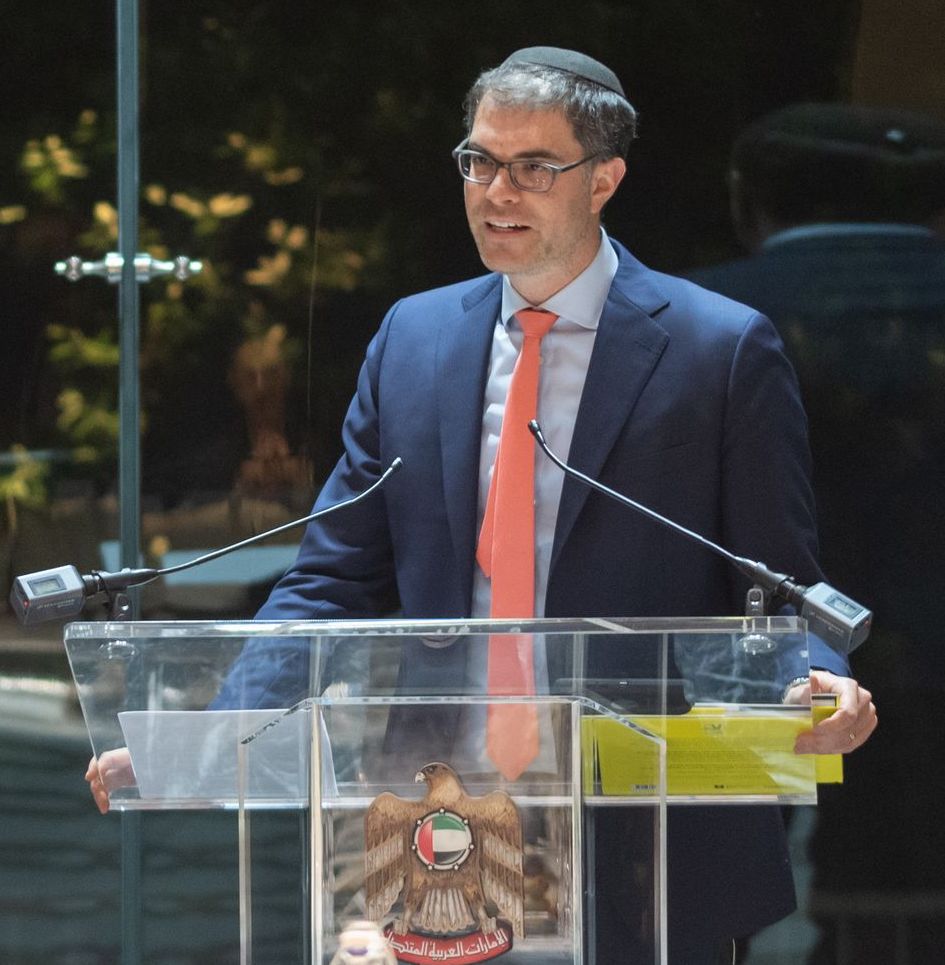
Rabbi Yehuda Sarna. (Courtesy UAE Embassy Washington)
Beth wrote to Sarna to learn how Jewish faculty and students would observe Jewish life while living in the Gulf, and requested a meeting upon his visit to the Gulf. They met when he accompanied Sexton on one of his visits.
Meanwhile, she wanted to find other Jews in the Emirates.
“As we met people, we invited them for Shabbat. We met Sharon and Simon, and through them, Elli and Ross. We collected people and families over time. We met Jewish people from around the globe,” she explains.
“We created a Jewish women’s group, and several times the women would come to Abu Dhabi to see… our way of life. AJC [the American Jewish Committee] sent a group of young Jewish college women to Ziad University, and I took them around and gave them an understanding of life in Dubai,” she relates.
Educating their son in Judaism was important to the Rupps.
“We had a mezuzah,” she says, referring to a religious scroll attached to the outside of a home’s doorpost, where it is seen by passers-by. “But it was on the inside of the door.”
We had a mezuzah. But it was on the inside of the door
She recalls that on one Rosh Hashana, her son took apples and honey to school. Dipping slices of apple in honey is a traditional way people wish one another a sweet year during the holiday.
“Another boy noticed it and asked if he, too, had eaten it at home [the previous] night. They became friends, and years later studied for their bar mitzvas together,” she says.
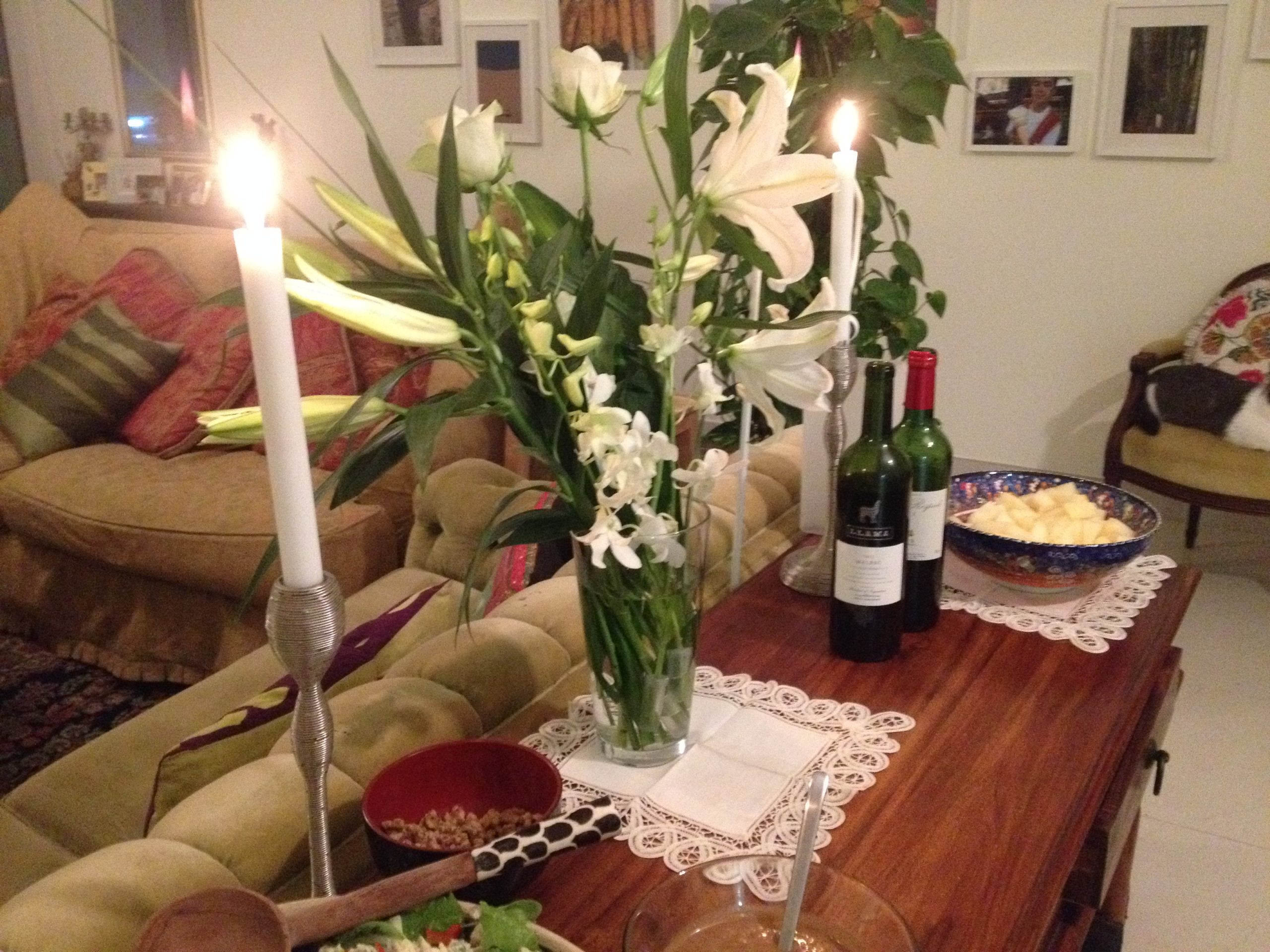
Rosh Hashana in Abu Dhabi, 2013. (Courtesy)
At the same time that Beth was home-schooling her son in Jewish studies, a Jewish woman was offering instruction in Hebrew.
Prof. Joel Bernstein was recruited early on by NYU to teach chemistry in Abu Dhabi. His life partner, Tzipi Springer-Eynot, was an Israeli born in Kazakhstan who had landed in Israel by way of a post-war German DP camp. She went with him on their scouting trip.
“On the flight, I noticed Israel was not part of the map of the Middle East and I told Joel I don’t want to go to place which doesn’t recognize Israel as a country,” Tzipi tells The Media Line. “When we arrived, we met staff and were taken for a tour. I [nevertheless] found the place intriguing and unique.”
Having a background in teaching, Tzipi was asked to provide instruction for a student from Hungary who wanted to continue his studies of the Hebrew language. Suddenly, there were 15 students from around the world, including Yemen, Jordan and Morocco, who wanted to learn Hebrew.
“I taught them bi-weekly,” she says. “They had a willingness to learn, and curiosity. I taught them about the Jewish holidays as well.”
The ‘tale of the wandering Jew’ and the need for Jews to find one another is illustrated by Beth Margolis Rupp’s anecdotes of the people who have traveled through, and those who have sought each other out. It turns out that she, too, was a player who was being noticed without her knowing it.
“I was honored to be invited to the home of Sheikh Nayhan bin Mubarak Al Nayhan, the minister of culture, youth and social development, to his Eid majilas – events in the homes of the leadership in the country where they make themselves accessible and converse on various topics, offering the sheikhs the opportunity to hear from the people,” she relates. “I was with the sheikh for a few minutes, and then escorted back to the women’s section for dinner.”
I was honored to be invited to the home of Sheikh Nayhan bin Mubarak Al Nayhan, the minister of culture, youth and social development, to his Eid majilas – events in the homes of the leadership in the country where they make themselves accessible and converse on various topics, offering the sheikhs the opportunity to hear from the people. I was with the sheikh for a few minutes, and then escorted back to the women’s section for dinner
Meanwhile, Beth’s work at NYU was in researching NGOs, governmental institutions and religious institutions and the way they were meeting the needs of societies.
“I saw the religious institutions providing comfort and resources to [the] people,” she states. “I spent time speaking to imams, with various churches, and went to Hindu temples.”
Beth describes as “unnerving” a telephone call she received from Rev. Andrew Thompson, head of Abu Dhabi’s St. Andrews Anglican Church, who was seeking out someone who knew what was going on in the city’s Jewish community. Not surprisingly, though, after several meetings, the reverend became an invited guest at the Rupp’s Shabbat table.
“It takes three cups of coffee to become friends with someone, and that’s the way it was in Abu Dhabi,” Beth says.
In 2013, Rev. Thompson convened a meeting of religious leaders in the home of the deputy chief of mission at the United States Embassy, Ethan A. Goldrich.
Representatives showed up to talk about their community, and the concept of a book on tolerance evolved. The reverend knew the crown prince, sheikhs and government officials, and he brought the concept to them. Several years later it became Celebrating Tolerance.
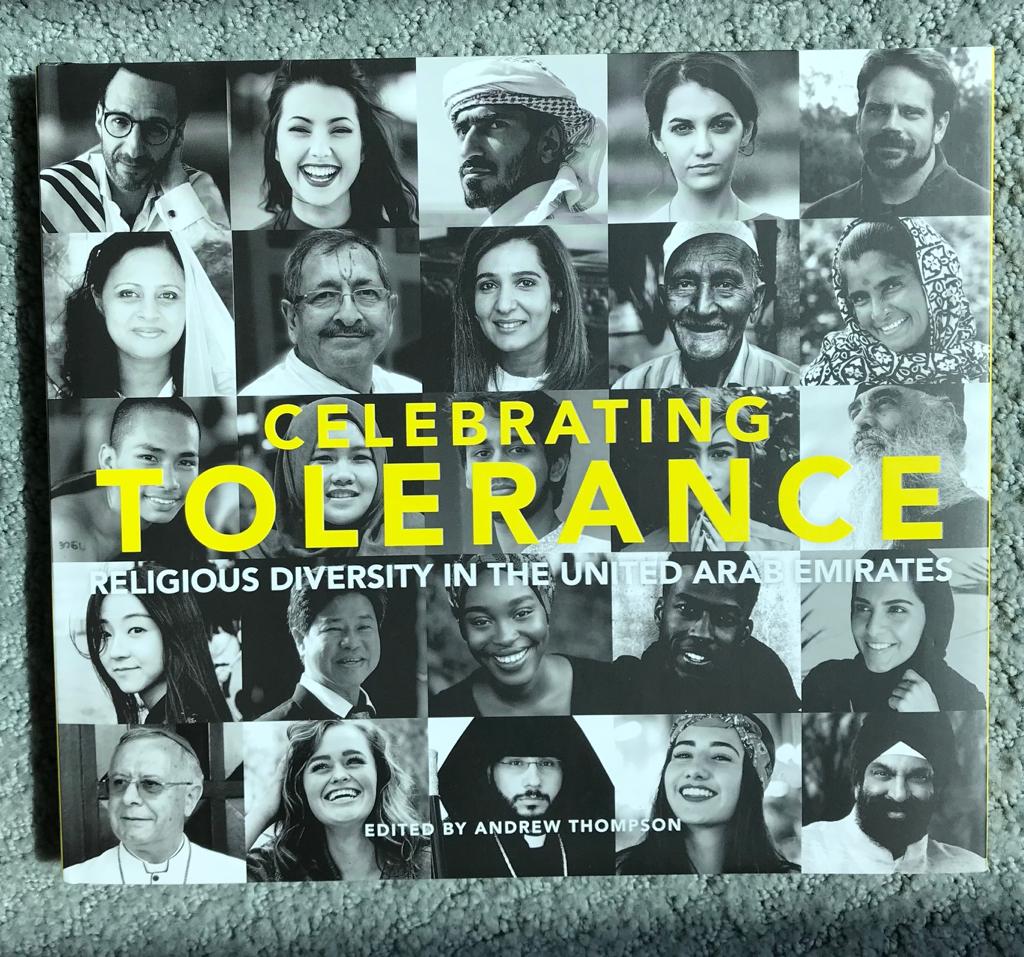
The cover of ‘Celebrating Tolerance.’ (Courtesy)
The Rupps left the UAE to be with Beth’s dad, who was getting on in years.
“I helped build an amazing, vibrant Jewish community,” she says. “It was rich, not one denomination – not only Orthodox, Conservative, Reform, Reconstructionist or secular. I also realize how grateful I am to Ross [Kriel] and the Orthodox Jewish community, and the deep importance of the need to have a minyan. These people held the principles of Jewish life together and created the opportunities for everybody to be there.”
Would she go back?
“I’d move back,” she says, “in a heartbeat.”
Jean Candiotte
Born and raised in Bethpage, New York, a writer and producer of video content for multimedia platforms, Jean Candiotte told her lawyer husband Barry Greenberg one snowy January morning in 2014 that she had a chance to do a Skype call for a job in Dubai. Barry, too, was seeking his next big gig.
Jean had been working with multinational entertainment companies, including News Corp, Viacom and NBC Universal. This was an opportunity to be a creative director for OSN, a Dubai-based direct-broadcast company.
“I interviewed in January, signed a contract in February, and two months later, we were in Dubai. The flight was on a Friday, we arrived on Saturday, and I began working on Sunday,” she tells The Media Line.
“On Monday night, my husband Barry and I were partaking of a communal Passover meal, the Seder. Elli and Ross [Kriel] and other community members were at one of two Seders,” she relates.
Jean’s mother was raised Orthodox, and her father, if asked, would state “I’m Sephardi!” The family attended a Conservative synagogue, where Jean had a bat mitzvah. Barry had less of a Jewish experience growing up.
Jean notes that “many of us arrived in Dubai not wanting to make our Jewish identity known” to the wider public.
“For me it started changing during the past year or so because of the Year of Tolerance, which the UAE government announced in 2019, and [because Crown Prince] Sheikh Mohammed bin Zayed announced plans for the Abrahamic Family house, which would be a multi-faith campus and educational center consisting of a mosque, a church and a synagogue,” she explains. “The UAE is proving how progressive they have been in this area.”
For me it started changing during the past year or so because of the Year of Tolerance, which the UAE government announced in 2019, and [because Crown Prince] Sheikh Mohammed bin Zayed announced plans for the Abrahamic Family house, which would be a multi-faith campus and educational center consisting of a mosque, a church and a synagogue. The UAE is proving how progressive they have been in this area
In 2016, Beth Margolis Rupp, together with Jean and Ross Kriel, were asked to write and edit the chapter dedicated to the UAE’s Jewish community in Celebrating Tolerance, which by this time had been commissioned by a government ministry.
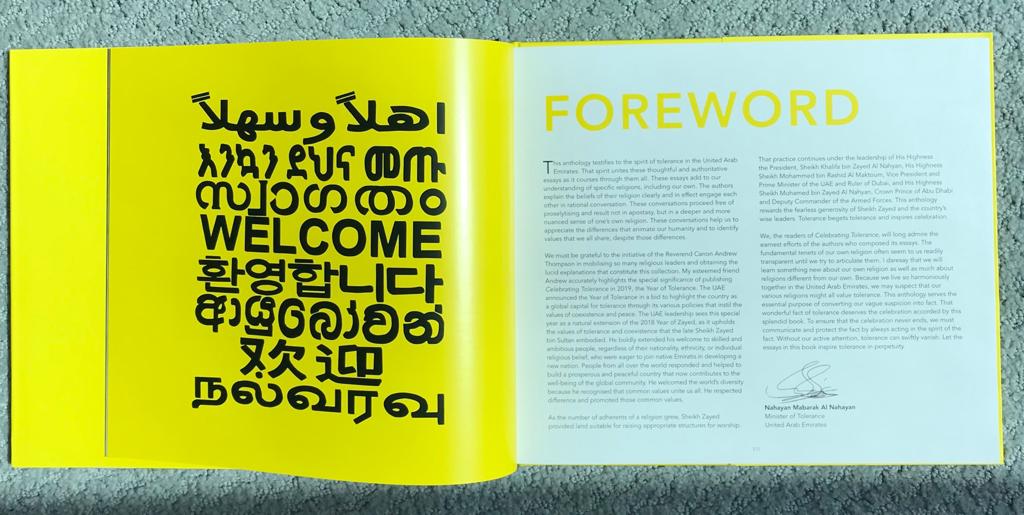
The foreword to ‘Celebrating Tolerance,’ signed by Minister of Tolerance Nahayan Mabarak Al Nahayan. (Courtesy)
“Our story of ‘coming out’ and being accepted was [in a] chapter celebrating 12 minority religious communities in the UAE,” she says. “It was published in 2019, and a copy was given to Pope Francis during his visit to the UAE – his first to a Gulf country – when he signed the Document of Fraternity.”
Jean notes that a quote in the chapter “expresses [their] sentiment.” It says: “We are neighbors here, and if you look back, you’ll see that we are actually each other’s family from long ago. You may see us wearing our Hand of Miriam as you wear the Hand of Fatima. We are grateful for our lives here, for the opportunity to be recognized by the UAE government, and for being able to share our story.”
We are neighbors here, and if you look back, you’ll see that we are actually each other’s family from long ago. You may see us wearing our Hand of Miriam as you wear the Hand of Fatima. We are grateful for our lives here, for the opportunity to be recognized by the UAE government, and for being able to share our story
Jean says: “We felt acknowledged in a wonderful way. It acknowledged our community and I felt great about living in a community doing so much about tolerance.”
In March 2020, she was asked to speak to the European Parliament in Brussels as part of a conference about tolerance. Rev. Thompson was one of several speakers. The keynote speaker was H.E. Dr. Ali Rashid Al Nuaimi, chairman of Hedayah, the International Center of Excellence for Countering Violent Extremism, and a member of the UAE Federal National Council based in Abu Dhabi. He traveled from Abu Dhabi to attend along with his staff.

Jean Candiotte speaks at the Creating a New Narrative of Tolerance conference in Brussels in March. (Courtesy)
“These points got us over the mountain to the place we are today,” she states.
“It’s been personal growth that has kept me here, and for my husband a great career opportunity,” Jean says. “The overall experience in the UAE has been exciting, and made us want to stay.”
Rebecca and Yoni
Australia-raised Rebecca – who prefers to keep her family name private – was born in Botswana to Israeli parents, who then moved to New Zealand and finally Australia, where she spent her adolescent years.
Rebecca moved back to Dubai a second time because of a job opportunity. She also missed life in the Middle East.
The family of her husband, Yoni, had moved to Singapore from Israel. Yoni’s father was born in pre-state Israel. His mother came from an Orthodox family. Yoni himself was raised on Kibbutz Bror Hayil near Ashkelon, founded by Egyptian Jews.
Rebecca is Sephardi on her Tunisian mother’s side and Ashkenazi on her Polish father’s side. Her dad grew up attending synagogue but the family was not fully observant.
Yoni and Rebecca met in Australia, where they were married in a civil ceremony. Three months after arriving in Dubai in 2012, they traveled through Jordan to Israel, where they underwent an additional ceremony.
During their first time living in the UAE, Yoni was hired as a design researcher for NYU Abu Dhabi, and Rebecca, a trained psychologist, worked at a well-known clinic in Dubai. There was no formal Jewish community then, but according to Rebecca, NYU’s chaplain, Rabbi Sarna, “directed us to the blossoming Jewish community in Dubai, where we would come and spend Shabbat with Elli and Ross [Kriel], and often stay with them.”
As the community began to establish itself, the couple left to raise their two children in Australia. But missing the Dubai clinic, which in the interim had grown, Rebecca was anxious to return, which the family did in 2019. Yoni is now head of design for an online real estate portal.
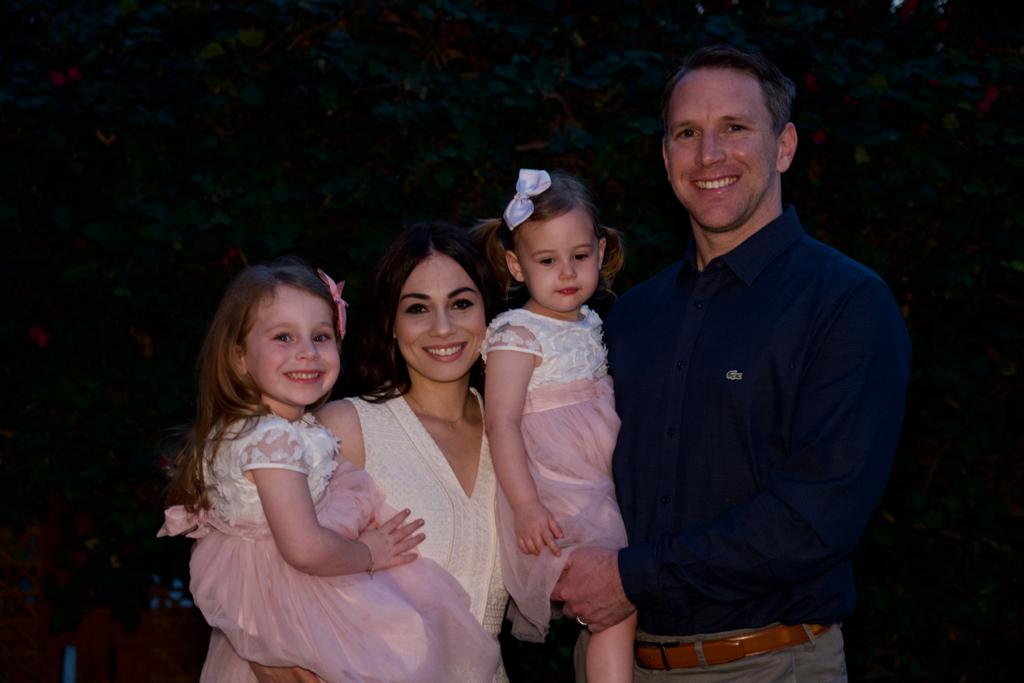
Rebecca and Yoni with their daughters. (Courtesy)
Raising their young daughters in the UAE, they spend a lot of time with the Kriel Family, among others, celebrating Shabbat and holidays.
“Online Jewish lessons, as well as online Shabbat services because of COVID-19, maintain our Jewish identity,” Rebecca tells The Media Line.
Online Jewish lessons, as well as online Shabbat services because of COVID-19, maintain our Jewish identity
“The government here has been working hard with Ross [Kriel] to establish a place of Jewish worship. The community development authority has to issue a license for the Jewish community to have its space and to be able to practice, as it does for any denomination, be it churches or temples,” she states.
Breakaway Synagogue
An old Jewish joke says that when a synagogue reaches its 11th man – one beyond the quorum for public prayer – a second synagogue is born. Rabbi Levi Duchman, who is associated with the Chabad movement (which is not officially recognized by the UAE government), recently established a second synagogue in the Emirates.
Duchman, according to members of the Jewish community, had been attending the Orthodox minyan for the previous five years. He appointed Solly Wolf, who attended services during High Holy Days, as president. The synagogue does not call itself Chabad.
Jewish Businessmen, Rabbis and Former Government Officials
Jewish businessmen have been trailblazers in opening the nexus between the United States and Dubai, as well as Israel.
Eli Epstein of Westchester, New York, began flying to Dubai 30 years ago for business as CEO of a large petroleum by-product company. During the years, he would bring rabbis and introduce top members of the American Jewish Committee to government officials.
“I was helping the AJC with introductions in the UAE, and the Jewish community was beginning to organize a Shabbat gathering in local hotels,” he tells The Media Line.
Epstein played a significant role as a conduit to some leading Emirati businesspeople, including Mohamed Alabbar, the impressive entrepreneur who built the Burj Khalifa skyscraper. He dedicated a Torah scroll for the community in honor of Alabbar, who witnessed the ceremony.
“The Torah has an Arabic dedication on the front acknowledging Mohamed’s leadership and the inspiration he offered to his generation,” Epstein says. “He spoke to the community on a Friday night and stayed for dinner. Mohamed played a key role for many I introduced him to.”

Ross Kriel, Eli Epstein and Alex Peterfreund at the Torah dedication ceremony. (Courtesy)
In addition to the scroll from London’s Marble Arch Synagogue, there is a third, this one from Temple Brith Shalom in Erie, Pennsylvania.
Epstein is considered a trailblazer.
“I didn’t know I was this,” he says, referring to the description.
“Over the years I became someone trusted, which enabled me to bring rabbis,” he states. “Over time, the Emirates realized that not all Jews are Israelis. I was early in the game. I didn’t sign up as a trailblazer. Frankly, I am changed. My worldview changed and I even pray differently because of Islam.”
Describing Epstein’s role from the perspective of the UAE’s Jewish community, Jean Candiotte tells The Media Line: “Eli is the poster child for being active in business and interactive in government, and therefore one of those people who help create the friendship between the UAE and the Jewish community.”
Looking ahead, Epstein says: “We’re heading into the blue yonder. It’s a watershed for Israel and the region, a harbinger of strategic realignment of the Middle East. Two years from now, we’ll look back, amazed at what happened. No one can count on America; in the Middle East, you are your own first responder.”
There have been many others who have frequented the UAE, working to open a dialogue among faiths and achieve recognition for the Jewish community on the Arabian Peninsula. They include Rabbi David Rosen, the AJC’s international director of religious affairs; Rabbi Y. Dov Krakowski of the Orthodox Union; Rabbi Dov Goldstein; Stephen M. Greenberg and Malcolm Hoenlein of the Conference of Presidents of Major American Jewish Organizations; Rabbi Marc Schneier, president of the Foundation for Ethnic Understanding; and Rabbi Michael Schudrich, the chief rabbi of Poland. In addition, Rabbis Marvin Heir and Abraham Cooper of the Simon Wiesenthal Center have spent considerable time engaging the Emirates.
“The early Simon Wiesenthal Center missions to the UAE were real eye-openers. We had the opportunity to meet with a young dynamic Crown Prince Mohammed bin Zayed, and with open-minded business leaders like Mohamed Alabbar, who revealed to us a place where our faith and our people were not merely tolerated, but respected,” Rabbi Cooper, associate dean and director of the Global Social Action Agenda for the Wiesenthal Center, tells The Media Line.
“It cannot be lost on anyone that all this takes place in the UAE as the last Jews of Yemen are hounded out of homes they have lived in for over a thousand years,” Cooper adds. “Only a fanatic Jew-hater like the Ayatollah Khamenei, who backs the Houthis [in Yemen], can be celebrating that an Arab nation is about to become Judenrein. Contrast this as the ruler of Abu Dhabi, His Majesty, Crown Prince Mohammed bin Zayed, as well as Dubai’s Sheikh Mohamed, pave the way for more Jewish people to come to Dubai.”
It cannot be lost on anyone that all this takes place in the UAE as the last Jews of Yemen are hounded out of homes they have lived in for over a thousand years. Only a fanatic Jew-hater like the Ayatollah Khamenei, who backs the Houthis [in Yemen], can be celebrating that an Arab nation is about to become Judenrein. Contrast this as the ruler of Abu Dhabi, His Majesty, Crown Prince Mohammed bin Zayed, as well as Dubai’s Sheikh Mohamed, pave the way for more Jewish people to come to Dubai
Under the radar
Although news of ongoing contacts between officials from Israel and the UAE continue to surface, many visits by Israelis have been, and will continue to be, under the radar. These include government figures, Mossad agents, executives from defense and security companies as well as other strategic partnerships.
In 2018, then-minister of sport Miri Regev escorted Israel’s national team to the International Judo Federation Grand Slam in Abu Dhabi. The current director of the Mossad, Yossi Cohen, made a high-profile visit to the UAE after many clandestine meetings in the Gulf region, which cemented the recent deal toward normalization.
In 2001, Dr. Efraim Sneh, a cabinet minister and retired brigadier general, traveled secretly to Dubai.
“I was in the inner cabinet of Prime Minister Ariel Sharon and went to the UAE for the purpose of establishing relations, and had very high-level meetings,” Sneh reveals to The Media Line. “Since then, I have been advocating between Israel and the Gulf countries, and have been there many times in the past year acting to cement relations between Israel and the UAE.”
On waking up to the Abraham Accord
Ross Kriel: “I thought many steps would be taken until we had full diplomatic recognition. People could see where it was going, so quickly as well. We hope that this is just the beginning and will invigorate completely new paradigms for people in the Middle East, one that is based on the ability to make change and move forward. … Five years ahead, Emirates and Israelis are so open to this. I’m hoping it produces better stability and economic growth.”
Elli Kriel: “It’s an amazing turn of events. I was shocked, quite honestly, and thought the deal was coming in one year’s time. I thought things would open up for the Expo, but not this soon. We received a barrage of responses and it changed things here, too. It allows us to be public without any reservations. Before we had to be careful. … My daughter sang the UAE’s national anthem in Arabic, and it went viral. … This paves the way for positive and constructive development, setting an example how many cultures can live together in one small place. I do hope it will be received positively around the world.”
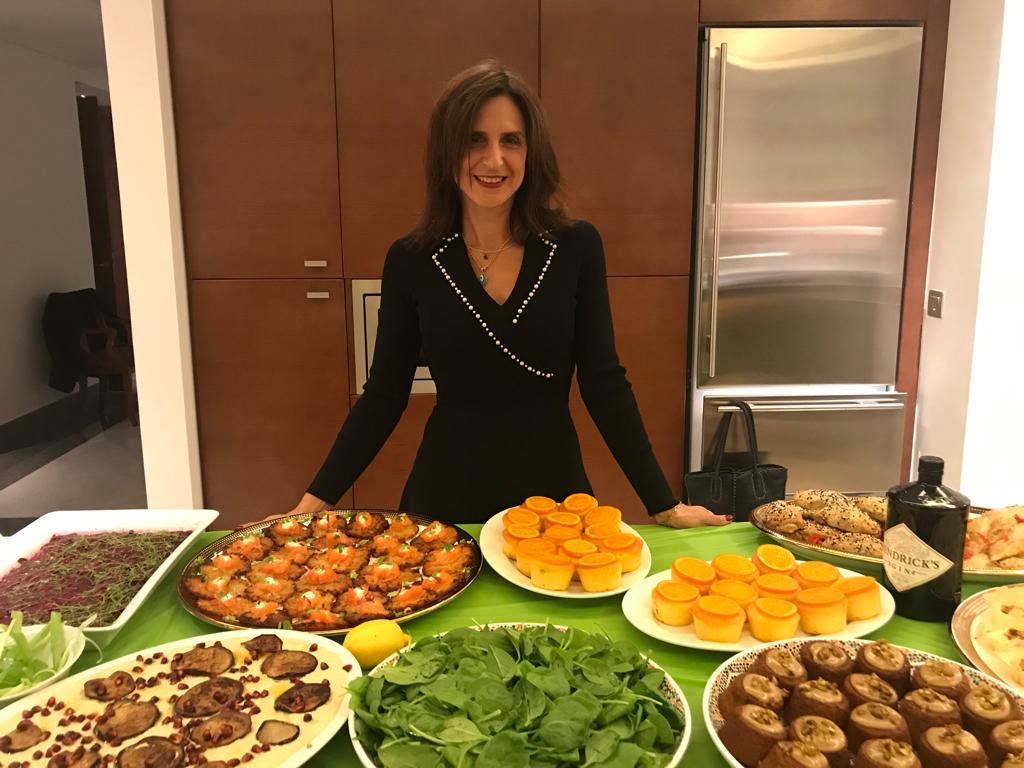
Elli Kriel at a table of sumptuous food she prepared. (Courtesy)
Alex Peterfreund: “At 3 in the morning, when the news broke, I couldn’t sleep. I was chatting with Ross on WhatsApp thinking that in 10 years, there may be 20,000 Jews living in Dubai and we will be sitting in the back of the synagogue remembering those times when we prayed together. If you told me this deal was happening, I’d tell you science fiction is on the second floor.”
At 3 in the morning, when the news broke, I couldn’t sleep. I was chatting with Ross on WhatsApp thinking that in 10 years, there may be 20,000 Jews living in Dubai and we will be sitting in the back of the synagogue remembering those times when we prayed together. If you told me this deal was happening, I’d tell you science fiction is on the second floor
Jean Candiotte: “I read it on my WhatsApp in disbelief; I felt I was in a dream. It is a great movement toward peace. We felt we had planted the seeds and it was growing, but I didn’t think I’d see it during my time living in the UAE.”
It is a great movement toward peace. We felt we had planted the seeds and it was growing, but I didn’t think I’d see it during my time living in the UAE
Rebecca: “I felt it was coming. I have a lot of Emirati friends and clients [who are] well established in the community and hear a change in business and political points of view. I hear of the US soldiers coming here who were trained in Israel, and the sharing of knowledge. I think it’s the best news we could have possibly gotten. I happen to live here and have a great deal of respect for the leaders of this country, who decided with full knowledge that it might not be the most popular or expected decision, and it might cause different types of political friction with Arab countries that deal with the UAE moving forward. … I think it is amazing for locals here to get to know Israelis who want to see the world and explore. … I see more initial exploration, but with normalization, a lot more for business endeavors.”
Sharon Eder: “I knew it was bubbling. I had relationships with Israelis who were trying to make that happen and wasn’t surprised. I think it’s great. What we had for these five years that helped make it happen was special for us. It gave us an identity.”
Giacomo Arazi: I have always said a full Jewish community can only happen [together] with peace with Israel. And I think it’s an exciting time for the Jewish community of Dubai. It’s an exciting place to be, that looks to the future. So does Israel; so do the Jews. I’m very optimistic.”
Beth Margolis Rupp: “I wish I [had been] in Dubai with the community for the announcement of the deal. I felt so proud of the community… on the ground.”
Rabbi Yehuda Sarna: “I am predicting that we will see a burst of intellectual creativity in terms of cross-continent education between the US and the UAE, and Jewish/Arab relations and studies.”
Epilogue
It’s nearing the first Sabbath in Dubai since the agreement to normalize relations was announced at the White House, and Omer Yankelevich, Israel’s minister of Diaspora affairs, Zooms into the community to teleconference an emotional greeting. (Her greeting follows congratulations delivered to the community by Prime Minister Binyamin Netanyahu on the evening of the accord.)
Ross Kriel takes extreme pride in the moment, graciously thanking all the Jews who came before him and who are there now, and all of the Jewish organizations and individuals who helped make the day possible.
“There were other Jews in the UAE, perhaps each one thinking, ‘I’m the only one.’” Jean Candiotte says.
Sharon Eder sees herself as something of a diplomat.
“We had Arab neighbors who never met Jews before, and had an impact on them,” she says.
The Jewish community of Dubai is clearly in transformation. It is opening a synagogue and kosher restaurant and is waiting with open arms to service businesspeople and tourists. The UAE has broken the glass ceiling in the Middle East, and this could not have happened without the Jews who reside there.
“Jews came from all over … for two main reasons: work and safety,” Rabbi Sarna tells The Media Line.
“It might sound ironic to some people that Jews feel safer in the UAE than they do in places in Europe or North America, but consider the rising anti-Semitism in those countries, excused in part by some prominent political voices,” he says. “Then come to the UAE and see the Year of Tolerance and the announcement of the Abrahamic Family House.”
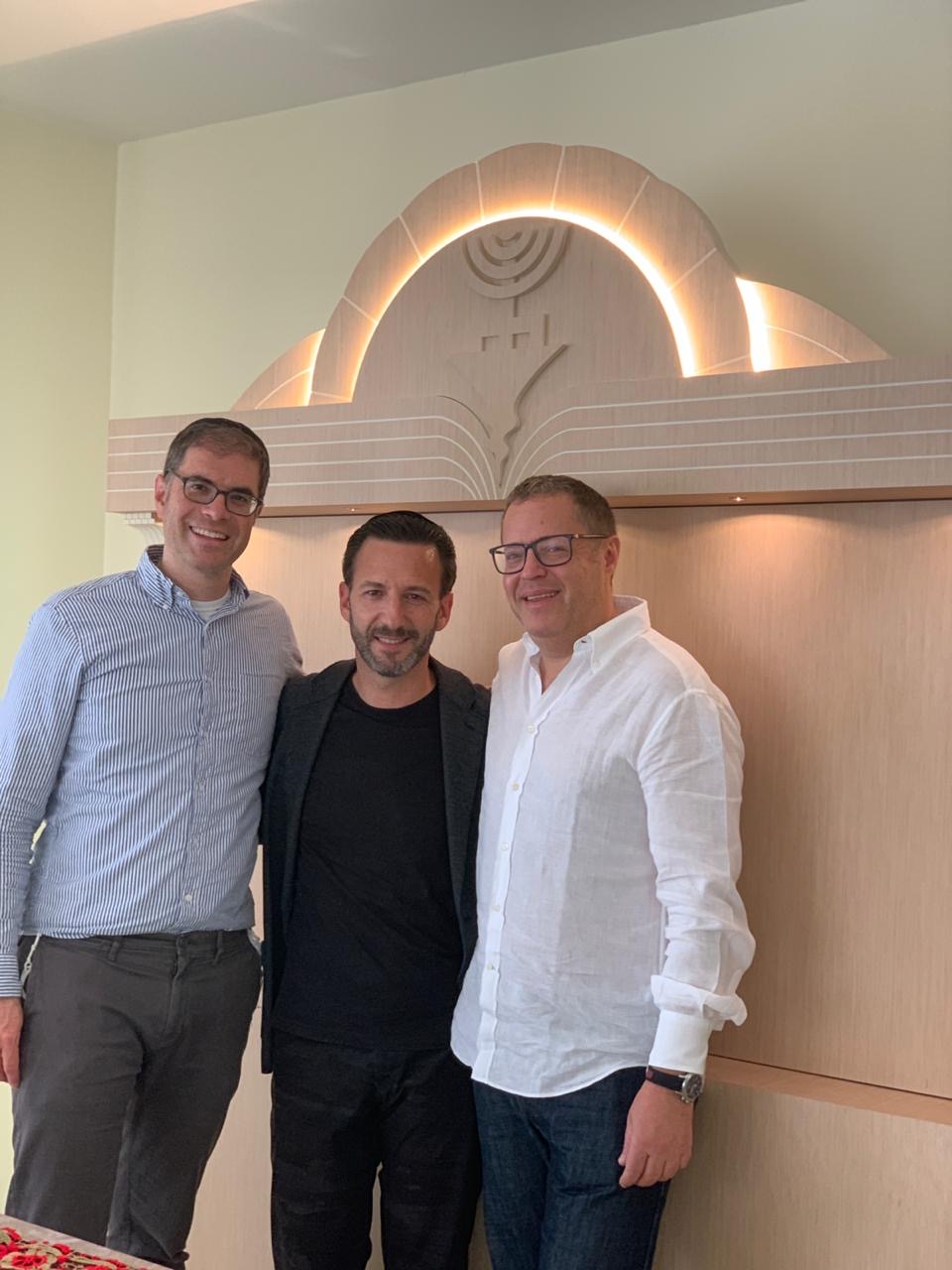
Rabbi Yehuda Sarna, Ross Kriel, and Alex Peterfreund at the The Villa. (Courtesy)
Alex Peterfreund says that for every Emirati going to Israel, there will be 200 Israelis coming to the UAE. He hopes the Emirati Jewish community can play a role in educating these travelers about the local culture and assist them with their needs, be it a place to pray or kosher food, Elli-style.
Expo 2020 will be delayed until next year and will house a large Israeli pavilion – not the one Israel planned to open prior to the Abraham Accord.
Jean sums it up.
“I feel like it’s a great step forward toward peace and understanding,” she states. “It’s a moment of hope and optimism when most of the headlines are not feeding hope and optimism.”
EDITOR’S NOTE: The author expresses her deep respect and appreciation to all who participated in the making of this article. She hopes all will understand the time and space limitations.